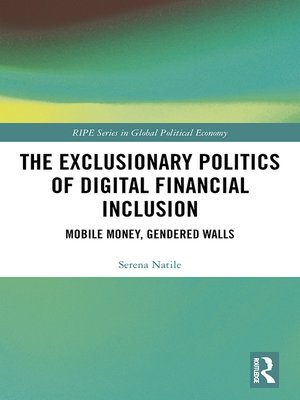The Exclusionary Politics of Digital Financial Inclusion
ebook ∣ Mobile Money, Gendered Walls · RIPE Series in Global Political Economy
By Serena Natile

Sign up to save your library
With an OverDrive account, you can save your favorite libraries for at-a-glance information about availability. Find out more about OverDrive accounts.
Find this title in Libby, the library reading app by OverDrive.



Search for a digital library with this title
Title found at these libraries:
| Library Name | Distance |
|---|---|
| Loading... |
Focusing on Kenya's path-breaking mobile money project M-Pesa, this book examines and critiques the narratives and institutions of digital financial inclusion as a development strategy for gender equality, arguing for a politics of redistribution to guide future digital financial inclusion projects.
One of the most-discussed digital financial inclusion projects, M-Pesa facilitates the transfer of money and access to formal financial services via the mobile phone infrastructure and has grown at a phenomenal rate since its launch in 2007 to reach about 80 per cent of the Kenyan population. Through a socio-legal enquiry drawing on feminist political economy, law and development scholarship and postcolonial feminist debate, this book unravels the narratives and institutional arrangements that frame M-Pesa's success while interrogating the relationship between digital financial inclusion and gender equality in development discourse. Natile argues that M-Pesa is premised on and regulated according to a logic of opportunity rather than a politics of redistribution, favouring the expansion of the mobile money market in preference to contributing to substantive gender equality via a redistribution of the revenue and funding deriving from its development.
This book will be of particular interest to scholars and students in Global Political Economy, Socio-Legal Studies, Gender Studies, Law & Development, Finance and International Relations.







